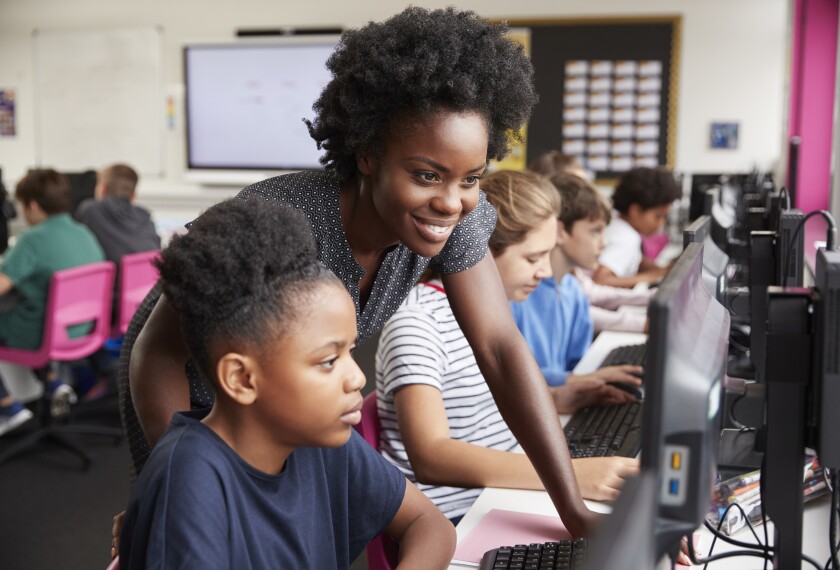Today’s students have grown up with smartphones, tablets, and virtual assistants. Most can comfortably navigate any new app or digital device and outsmart parental controls. That’s why adults often turn to them to understand how to use new technologies.
But educators have noticed that many students are missing basic technology skills and media literacy—such as typing on a keyboard, searching the web, determining if an online source is legitimate, or writing an effective email message—which are necessary for success, not just in school and careers, but in their personal lives too, experts say.
“In our digital classrooms, it’s all about giving students the tools they need to navigate and shape the world of tomorrow,” said Dyane Smokorowski, the digital literacy coordinator for the Wichita school district in Kansas. “By weaving these tech skills into our teaching, we’re unlocking doors for our students to a future filled with possibilities.”
Education Week asked educators on Facebook, LinkedIn, and X what tech skills every student should have. Here’s what they said:
1. Basic Computer Skills

Students should have foundational computer knowledge and skills, such as how to turn on a desktop computer (yes, some respondents noted this!), how to open a file with the right program, how to find a document, and how to save files on an external hard drive. They also mentioned that students should develop typing skills if they are going to be using computer keyboards regularly.
2. Digital Communication Skills

Educators said it’s important for students to be able to communicate their ideas clearly using technology, whether it’s through email, social media, video conference, or word-processing and presentation programs (like Google Docs or Microsoft PowerPoint). Students should also be able to work with others in a digital environment together in real time or collaborate at separate times with shared files.
3. Cybersecurity

Students need to have skills that will protect their sensitive information from cybercriminals, educators said, especially as cyberattacks become more sophisticated. They need to learn not to share personal information, should be able to recognize when a website is secure and legitimate, and know how to avoid email phishing attempts by hackers.
4. Media Literacy

Media literacy is about having the skills to access information, analyze and evaluate it, create content, and act on it using all forms of communication, whether it be through print, TV, or the internet. Ensuring students have this skill is even more important now with the rise of artificial intelligence and its ability to generate text, audio, images, and video, educators said. Students need to be able to think critically and evaluate the authenticity and reliability of any information they see and hear online.
5. Digital Citizenship

Similar to media literacy, digital citizenship is about teaching students how to use technology thoughtfully and empathetically. Students need to know how to be kind and respectful in online spaces, so that others feel safe and welcome to participate, educators said.
6. Research/Data Analysis

Having effective internet search skills is very important for students, according to educators. Students should be able to sift through the oceans of information available online and be able to analyze what’s valuable and worth using or sharing.
7. Problem-solving

Students should know how to use digital technology to find solutions to the world’s problems, educators said, whether it’s coding an app that will save lives or figuring out how to clean up the ocean. They should know how to troubleshoot problems, show persistence, and be able to learn from failures.
8. Creativity

Last but not least, students should have time for fun and games that will help foster their creative thinking skills. They need to learn to use digital tools with their imagination to express themselves and connect with others, educators said, whether it’s through digital art or podcasts or videos.







